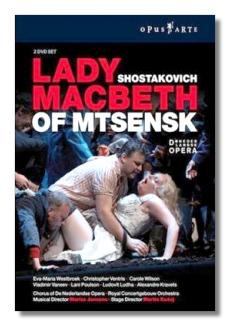
The Internet's Premier Classical Music Source
Related Links
- Shostakovich Reviews
- Latest Reviews
- More Reviews
-
By Composer
-
Collections
DVD & Blu-ray
Books
Concert Reviews
Articles/Interviews
Software
Audio
Search Amazon
Recommended Links
Site News
 DVD Review
DVD Review
Dmitri Shostakovich

Lady Macbeth of Mtsensk
- Eva-Maria Westbroek – Katerina Lvovna Ismailova
- Christopher Ventris – Sergey
- Vladimir Vaneev – Boris; Old Convict
- Ludovit Ludha – Zinovy Borisovich Ismailov
- Carole Wilson-Aksinya and female convict
- Lane Poulson – Sonyetka
- Alexandre Kravets – Shabby Peasant
- Alexander Vasiliev – Priest and Guard
Chorus of Nederlandse Opera
Royal Concertgebouw Orchestra/Mariss Janssons
Recorded Live 25, 28 June 2006 at the Het Muziektheater, Amsterdam
Opus Arte OA0965D LPCM Stereo Dolby Digital DTS 16:9 Anamorphic
What does one make of Shostakovich's controversial opera Lady Macbeth of Mtsensk? We associate the work with political and artistic oppression, sex, violence, greed… and freedom. Some of these elements are in the opera and some became attached to it after Stalin attended a performance of it in 1936 and, in effect, banned it and other modern Soviet works, works that followed more progressive or innovative paths in composition. Shostakovich was forced to withdraw the opera, and he eventually devised a more acceptable version of it called Katerina Ismailova, after the main, rather unsavory character.
You can't like Katerina Ismailova, or just about any other character in the opera. Katerina murders her father-in-law, Boris – but he deserves it. She then murders her husband, a less villainous fellow, but one you don't care about. Her motivations in both instances are sexual: she desires the rape-minded Sergey (who knows why?). Well, her deeds (and the complicit Sergey's) are uncovered and she and Sergey are imprisoned. Eventually, Katerina is murdered by fellow prisoners. In the Shostakovich original, she commits suicide. I'm not sure why stage director Martin Kusej changed the ending, or, for that matter, injected a fair amount of nudity and used a sort of greenhouse structure for Katerina's dwelling in the early acts. Was this to symbolize some sort of 'glass-house-don't-throw-stones' message? Who knows? Katerina also possesses a huge number of shoes, apparently to suggest her greed and selfishness.
Shostakovich's music is powerful and is played and interpreted brilliantly throughout the opera. Kudos to conductor Mariss Janssons and the Amsterdam Concertgebouw. The singers in the production are generally quite compelling, especially Vladimir Vaneev, a truly villainous father-in-law. 'Villainous', did I write? Actually, everybody's a villain in this opera. Shostakovich may have seemed to sympathize with Katerina, but I can't fathom why.
The production here will be controversial to most viewers but certainly not boring. Like many modern opera productions, the sets are barren and the action R-rated for its nudity and sexual situations. The sound reproduction and camera work are quite good. Shostakovich mavens will certainly want this set, as will those with an interest in 20th-century opera. This is not a tuneful or catchy work, but, with its colorful, often xylophone-dominated scoring it is spirited and compelling. It would be dubious to consider Shostakovich's place in opera alongside that of Prokofieff or even Stravinsky, but one has to wonder that if Shostakovich had continued to write operas (Lady Macbeth, his second opera, was his last complete one) that he might have evolved into a major figure in the genre. Recommended.
Copyright © 2007, Robert Cummings




















